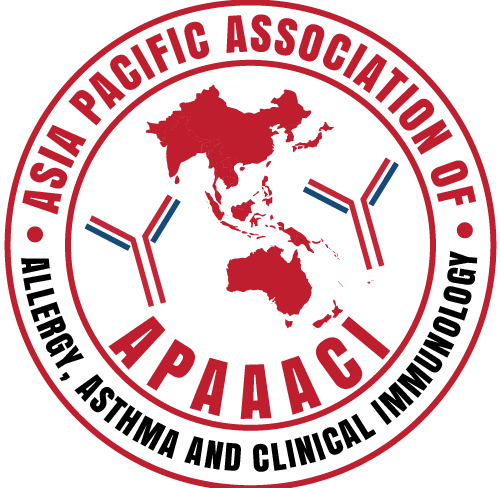APAAACI is the regional Allergy organization of Asia.
Its members consist of Asian societies which are representative of its allergy professionals in their respective geographical area. The constitution of APAAACI was modelled after that of WAO and other international allergy organizations and is apolitical.
APAAACI was formed at a regional allergy meeting held in Bali, Indonesia, in 1989, as the Asian Pacific Association of Allergology and Clinical Immunology (APAACI). The first Asian Pacific Congress of Allergology and Clinical Immunology (APCACI) was held in 1992 in Bangkok, and subsequent Congresses have been held every two to three years in Taipei (1995), Manila (1998), Sydney (2000), Seoul (2002), Tokyo (2004), Bangkok (2007) and Singapore (2010). The meetings in Sydney (2000) and Bangkok (2007) were held in conjunction with WAO’s World Allergy Congress of those years.
APAAACI has grown over the past 22 years to include membership of most professional societies in the Asian Pacific region. In 2000 the Association changed its name from Asian Pacific to Asia Pacific to clarify its geographic basis. In 2007, the Association’s name was updated to include “Asthma”, reflecting the importance of the condition in the Asia Pacific, and to the Association and its member National Societies. Congresses have increased in stature and have attracted the foremost international scientists and clinicians as contributors and participants. APAAACI Congresses are a major educational program, used to encourage exchange between countries for training programs and research. The 5th APAACI Congress was held in Seoul, Korea, in association with the 7th West Pacific Allergy Symposium, from 12-15 October, 2002. APAAACI is a supporter of the World Congress on Immunopathology which was held in Singapore from 2 – 6 December, 2002. APAACI also participated in the WAO Congress-XVIII ICACI 7-12 September, 2003 in Vancouver. The 6th APCACI was held in Tokyo in 2004.
The 7th Congress of APAAACI was held in Bangkok 2-6 December 2007, in association with the XX World Allergy Organization Congress. It was a great success with over 4500 participants from the region and around the world.
The 8th Congress held in Singapore, Nov 6th-9th 2010, as a conjoint Congress with the Asia Pacific Association of Paediatric Allergy, Respirology and Immunology (APAPARI). This was one of the most successful regional Congresses for APAAACI and APAPARI with 1400 registrants from the Asia Pacific as well as outside the region.
The 9th APAAACI Congress was successfully held in Taipei, Taiwan in 2013. The coming APAAACI congress ia a conjoint congress with the Asian Pacific Association of Pediatric Allergy, Respirology and Immunology (APAPARI) and will be held in Kuala Lumpur, Malaysia from the 17th of October to the 20th of October.
The House of Delegates at the 9th Congress in Taiwan voted to hold the 11th Congress in 2018 in Chiang mai, Thailand.
APAAACI moves Toward an evolution
Addressing the burden of allergic diseases in the Asia Pacific region that is the most populous and where the drive to urbanization is the greatest, there is a dire need of an integrated approach strategy to combat the major brunt of both communicable and noncommunicable diseases. The key elements to drive this strategy will be increased collaboration, communication, regional focus within the framework of globalization, harmonization, and integration. We have a responsibility to highlight these impacts to those who develop policies and educate the people.
Within this framework epidemiological studies, environmental control measures to reduce indoor and outdoor pollutants, allergy preventative strategies, bridging the knowledge gap, raising public awareness through targeted programs, engaging and advocacy with policy makers and partnerships with global bodies and multicountry consortia are essential elements for implementation.
Globalization is creating an interdependence that affects both the risks of disease and their potential solutions. Global connections are much more apparent in the case of communicable infectious diseases as is seen in the current pandemic of coronavirus disease 2019 (COVID-19), since viruses and bacteria are more readily perceived as cross-border threats; consequently, these diseases prompt global cooperation.
Advocacy to energize policymakers to recognize the need and make targeted efforts toward a common goal of reducing the burden of allergic diseases and a more integrated, holistic approach to treatment are essential to prevent unwanted deaths and improving the quality of life of patients. All of our members will have an integral role to play in the future to achieve the above.
As we embrace the need for change, we continue to focus on people as well as science. We achieve this by creating programs for motivational and inspirational learnings from global leaders to share their inspiring life-path career journey. Through this we aim to engage with the younger generation to learn and be inspired by these talks. We furthermore focus on the career development of junior members through mentorship from our seniors and through several centers of excellence. We also focus on building better collaborative spaces in the digital world where people can share knowledge and ideas with access to learnings.
Person to person interaction and sharing of knowledge are essential to APAAACI. Therefore, we will continue with the in-person meetings as will be the APAAACI International Conferences and the APAAACI Congresses. Moreover, we will consolidate our efforts to ensure that they are maximized learning and interactive experiences. We aim to integrate this by extending the discussions to the online world allowing those learnings and discussions to continue to be shared.
Ww also collaborate with global bodies like the WHO, UNEP, UN and various governments.

